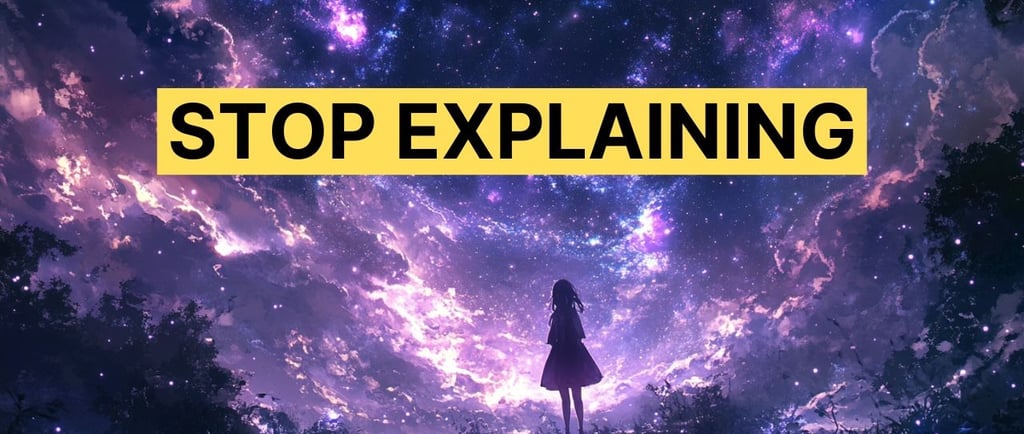The First Step to Change. Stop Explaining.
We often tell ourselves stories to justify our behavior - but those stories don't lead to change. True growth begins when you drop the excuses, face the facts, and ask the right questions. Shift from explaining your actions to understanding them, and you'll unlock real power to change.
5/12/20254 min read


Have you ever noticed how we constantly talk to ourselves, trying to explain why we do—or don’t do—certain things?
“I didn’t have time today.”
“I just wasn’t in the right mood.”
“It’s not my fault, something came up.”
These explanations feel valid in the moment. But they’re not always helpful. In fact, they can often get in the way of real change.
Consciousness Comes After the Fact
At the conscious level, we are only dealing with the results of what the brain has already decided.
By the time you think you’ve made a decision, your brain has already made it. Consciousness is the narrator, not the driver.
The brain—shaped by your past experiences, needs, environment, and instincts—makes the real calls. Your conscious mind comes in afterward to interpret and explain those calls. It builds stories, justifications, and reasons. And while those stories might help you feel in control, they can also be misleading.
That’s why it’s so difficult to consciously force yourself to change. You can’t just decide to do something and expect it to stick—because your deeper patterns, habits, and brain processes are still operating behind the scenes.
Why Excuse Hold Us Back
Let’s say you’ve been trying to build a new habit—like exercising regularly. You tell yourself:
“I couldn’t do it this week because work was crazy.”
“I was tired, so I’ll do it tomorrow.”
“It’s too hard to stay consistent when I have so many things going on.”
These are all explanations. They sound reasonable, but they don’t solve anything. They don’t help you change your behaviour.
Explanations are often just smokescreens. They allow us to avoid the uncomfortable truth and avoid taking real responsibility. But if we want to grow, improve, or change a habit, we need to go beyond explanation.
We need to start making statements.
How to Know If It's Just an Excuse
Let’s say you want to stop doing something or start doing something new.
Write it down.
Then write a few reasons why you can’t do it right now.
Now ask yourself:
Does this reason help me take action and change the situation? OrDoes it justify doing nothing?
If it’s the second one—it’s just an excuse.
Don’t overthink it, and don’t take it seriously.
From Explanation to Statement
A statement is simple. It names reality without judgment, excuse, or story.
Instead of saying:
“I didn’t finish the project because I was too busy.”
Say:
“The task is not finished.”
That one shift removes the excuse and brings your attention to the fact. Now you can do something about it.
Here’s another:
“I can’t lose weight because I have no time to cook.”
Becomes:
“I eat cake every evening.”
See the difference? One is a story. The other is reality. When you face reality, you get your power back. You stop blaming and start choosing.
If You Want to Break a Bad Habit
Start by answering the following questions honestly.
How much does this habit really bother you?
Why do you believe this habit is harmful? How does it affect others in your life?
What would your life be like without this habit?
How long have you struggled with it?
What have you tried in the past to stop it?
What actions make up the habit? Break it down into steps.
What happens right before you repeat the habit? Who is around? What are they doing?
What thoughts run through your mind during the habit? How do you feel afterward?
What benefits (even small ones) do you get from keeping the habit? Be honest.
What do others do to successfully overcome this habit? What do you know—and what don’t you know—about how they did it?
These questions help you uncover the truth, not the story. The more detail you see, the more clearly your brain understands the pattern—and the easier it becomes to change.
If You Want to Build a New Habit
Use the same strategy: ask questions that strip away the noise and reveal the core.
How badly do you want this new habit?
Why do you want to develop it? What’s missing in your life without it?
How will this habit improve your relationships, health, or peace of mind?
How long do you want to stick with it?
What have you tried before? What worked and what didn’t?
When did you most feel the need for this habit?
How did you feel after failing to stick to it before?
What will happen if you don’t build this habit?
What do you gain by not having it yet? What payoff do you get from the status quo?
How afraid are you of staying the same?
Again, the goal isn’t just to answer these questions—but to see what’s really going on.
Consciousness Can't Control But It Can Ask
It’s true that our conscious mind doesn’t control everything. It’s not a steering wheel—it’s a spotlight. It doesn’t command the brain, but it can influence it by asking the right questions.
When you replace vague stories with clear facts, and emotional justifications with objective understanding, you help your brain form a new map of reality. And that map helps guide new behavior.
So next time you’re stuck, don’t explain. Observe. Ask questions. Make statements. See clearly.
Because only when you stop lying to yourself—can you start changing your life.
Goals Motivation | Achievement |Success Mindset | GoalSetting |Self Improvement |Personal Development | Inspiration | Positive Mindset | Motivational Speech
